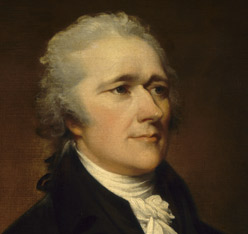Related Topics
..Tax and Fiscal Issues in the Constitution, Morris (1)
For some founding fathers, monetary issues were all that mattered.
Paper Money
The Constitution does not prohibit paper money, as a glance inside almost any wallet will demonstrate. Although counterfeiting was a common problem in early America because of the primitive state of 18th-century printing, and the problems of inflation were commonly confused with the use of paper money, the Colonial merchant class mostly knew better. Paper money was a term of art for inflation, mostly evidenced by shortages and price controls, escalating prices and hoarding of goods. The Nobel economist Milton Friedman was succinct: "Always and everywhere, inflation is a monetary problem." Friedman was cute and brief, but he might have been slightly more clear. Governments control the money supply, mostly by borrowing to delay paying for their own spending. Inflation is not caused by paper money, or banks, or price controls. It is caused by governments spending borrowed money, thus increasing the money supply faster than the goods money can buy.

|
| Alexander Hamilton |
America may not have had any hard money, and many people were having a difficult financial time of it, but in Morris's view, America was rich. America had rivers and forests, farms and factories, immigrants pouring in, and a prosperous energetic people already here. Even today, it is impossible to estimate what all that is worth, especially during periodic bank panics when everything seems worth a great deal less. A creditor wants to get his money back, so he will only loan appreciably less than he thinks the collateral is worth; a nation's real worth is therefore considerably greater than creditors collectively will lend. The creditors, unfortunately, don't really know what the nation is worth, either, and they have learned not to believe a word of what a debtor tells them. A nation's credit is estimated by the creditor community, and the one thing they know for certain is whether the nation has a history of paying its bills. A debtor may walk around in rags, or his wife may wear diamonds. The lender ignores all that; the question is does he pay his bills, promptly and in full. If he does that, he will have credit, and if he doesn't, he hasn't a dime of credit. What's America worth, according to that standard? About twice what the creditor is willing to lend him, and even that is a guess. It's why shop owners drive Cadillacs and investment bankers marry movie stars; and recently, why everyone had an inflated mortgage. Finally, it's why Alexander Hamilton wanted to buy up the war debts of the state governments, and pay off the worthless Continental currency. William Bingham may well have got rich speculating on Continental currency, but who cares. It's a cost of doing business, ultimately designed to assure you of ample credit.
Under the circumstances, it is sometimes difficult to understand why Morris was so moderate in his demands for clauses in the Constitution. He certainly did insist on the federal unlimited taxing power, which did in effect pledge the entire credit of the United States in the repayment of its debts, right down to the last shoe-button. And he was thwarted in even his own ability to make the four (Pennsylvania, North America, First and Second) national banks permanent. In general, however, Morris and Hamilton relied on the private sector and on legislation, rather than seek the sovereign level of federal power in the Constitutional Convention. When you recall those bullets whizzing around at Fort Wilson and at Yorktown, this level of self-restraint is rather remarkable.
Originally published: Tuesday, July 17, 2012; most-recently modified: Friday, May 31, 2019